
What is Eczema?
Eczema, also known as atopic dermatitis, is known to affect up to 20% of children and up to 10% of adults. It is a common, non-contagious inflammatory skin condition that causes dry, itchy, and inflamed skin. It mostly affects children and young people but can affect people of all ages. Eczema most commonly appears in the creases of the elbows, behind the knees, on the wrists or ankles. However, eczema can appear on any part of the body and often appears in ‘flare-ups’.
Eczema can begin at any age, but it commonly appears during infancy or early childhood. In some cases, it may even develop in adulthood. The exact onset can vary from person to person.
Types of eczema
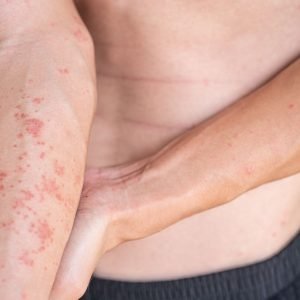
Atopic dermatitis
This is the most common form of eczema, often seen in individuals with a family history of allergies or asthma.
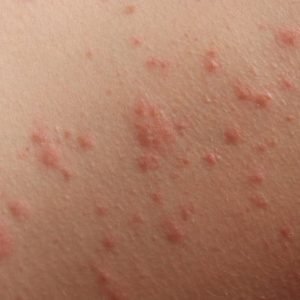
Contact dermatitis
This type of eczema is triggered by contact with irritants or allergens, leading to red, itchy, and sometimes blistered skin.
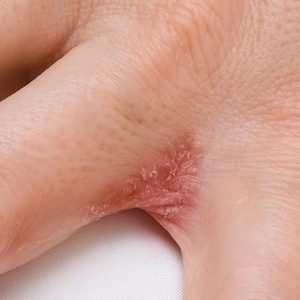
Dyshidrotic eczema
Characterised by the development of small blisters on the hands and feet, this type of eczema can be intensely itchy.
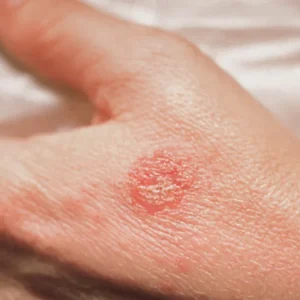
Nummular eczema
This form of eczema causes coin-shaped patches of irritated skin, typically on the arms and legs.
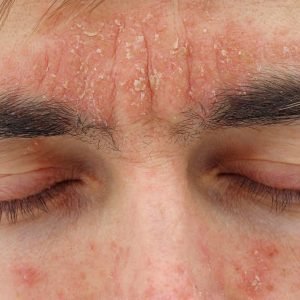
Seborrheic dermatitis:
Often associated with dandruff, this type of eczema affects areas of the skin rich in oil glands, such as the scalp, face, and upper chest.
Symptoms of eczema:
- Itching: often intense, especially at night
- Dry, sensitive skin
- Red to brownish-grey patches
- Small, raised bumps that may leak fluid when scratched
- Thickened, cracked, or scaly skin
- Raw, swollen, and sensitive skin from scratching
- Complication can include bacterial, viral and fungal skin infections due to the lesions created in skin from scratching
Triggers of eczema:
- Irritants like soaps, detergents, disinfectants, juices from fresh fruits, meats, or vegetables
- Allergens like dust mites, pet dander, pollen, mould and dandruff
- Microbes such as bacteria, viruses, and certain fungi
- Hot or cold temperatures, high and low humidity
- Foods like dairy products, eggs, nuts, and seeds
- Stress
Causes of ezcema
Conventional Medicine
According to conventional medicine, eczema is a common skin condition that causes dry, itchy, and inflamed skin, the exact cause of which is not fully understood.
It is believed to be a combination of genetic, environmental, and immune system factors with triggers that can exacerbate eczema symptoms. These can include irritants like soaps and detergents, allergens such as dander, pollen, microbial infections, stress, and changes in temperature or humidity. A dysfunctional skin barrier and an overactive immune response are also thought to play a role in the development of eczema. Conventional medicine approaches eczema treatment with a variety of methods.
Treatment may involve:
Topical corticosteroids to reduce inflammation and itching, moisturizers to keep the skin hydrated, antihistamines to relieve itching, and in severe cases, oral or injectable medications such as corticosteroids or immunosuppressants.
Identifying and avoiding triggers, such as soaps or detergents, is an important part of managing eczema with this approach.
Functional Medicine
According to functional medicine, eczema is a complex condition with various potential causes.
Functional medicine aims to address these causes, taking a holistic approach.
Treatment may involve:
Exploring factors such as gut health, food sensitivities, inflammation, immune function, stress, hormone levels and immune response, as these can all impact the development and severity of eczema. Functional medicine practitioners seek to develop individualized treatment plans that may include dietary changes, supplementation, stress management techniques, and other lifestyle modifications to support overall health and treatment of the condition.
Chinese Medicine
In Chinese medicine, the causes of eczema are often attributed to imbalances in the body, particularly related to heat, dampness, and blood.
Heat in the blood is believed to cause inflammation and redness in the skin, which triggers eczema flare-ups. Excessive dampness in the body is thought to obstruct the flow of energy which can lead to the development of eczema. A deficiency of vital energy (qi) and blood can weaken the body’s ability to protect and nourish the skin, leaving it more susceptible to eczema. Emotional imbalances, such as stress, anxiety, and frustration, are also considered to be potential contributors to eczema development. Chinese medicine takes a holistic approach, aiming to address the root cause of the condition rather than just the symptoms.
Treatment may involve:
A combination of herbal medicine and acupuncture to rebalance the body’s energy and restore harmony. Dietary adjustments, such as avoiding certain foods that may exacerbate eczema, and lifestyle modifications, such as stress-reducing activities, may be recommended to support the healing process.
Impacts of eczema on mental health, confidence, and self-esteem

Eczema, also known as atopic dermatitis, can have a profound impact on your mental and emotional well-being. The severity and visibility of eczema symptoms can vary widely amongst individuals.
Physical discomfort and appearance: eczema is often accompanied by itching, redness, and skin peeling. This can be both physically uncomfortable and visibly noticeable. The chronic nature of eczema, along with unpredictable flare-ups, can lead individuals to feel self-conscious about their appearance.
Social withdrawal and isolation: due to embarrassment or fear, individuals with eczema may avoid social interactions or activities they otherwise enjoy. This can lead to feelings of loneliness and isolation, further impacting your mental health and well-being.
Anxiety and depression: the stress of dealing with a chronic skin condition can contribute to the development of anxiety and depression. Concerns about appearance and managing eczema can become a significant source of daily stress, impacting overall mood and quality of life.
Sleep disturbances: the itching and discomfort associated with eczema can lead to difficulty sleeping, which can affect mood, cognitive function, and overall health. This can contribute to feelings of tiredness and low mood.
Impact on daily activities: eczema can make routine tasks more challenging. For instance, individuals might avoid swimming or other activities that could exacerbate their eczema or expose their skin to scrutiny. They might also spend a considerable amount of time applying creams or avoiding certain materials or substances that irritate their skin.
Relationships and intimacy: the visible aspects of eczema can affect personal relationships and intimacy, as individuals can feel self-conscious and avoid physical contact as a result of their skin condition.
Professional and academic life: in severe cases, eczema can affect an individual’s professional or academic goals, influencing their choice of career, clothing, or participation in certain activities.

How does hypnotherapy help treat eczema?

Hypnotherapy can be very effective in helping to treat skin conditions such as eczema. The treatment can help to address the root cause of the condition through deep relaxation, suggestion, visualisation and other techniques. In this way unconscious psychological factors that could be contributing to or exacerbating flare-ups, such as stress, anxiety, self-esteem or other factors, have the potential to be resolved.
Hypnotherapy can also help to reduce the urge to scratch which can prevent secondary infections (e.g. bacterial and fungal.)
A reduction of scratching promotes better sleep, which is crucial for skin healing and overall well-being. As hypnotherapy is a treatment that is based on deep relaxation, it can also help break the vicious cycle of stress related flare ups, which is so common amongst eczema sufferers. Easy self-hypnosis tools given to you by your hypnotherapist can also increase your ability to manage stress in future. This can have an effect on long term treatment outcomes, potentially reducing or even eliminating stress related flare ups. As a treatment modality clinical hypnotherapy is relatively easy (you just sit back and relax) and the experience of deep relaxation during sessions is considered by many a pleasant even ‘holiday-like’ experience.
Hypnotherapy can also have many positive side benefits. Chronic stress can create wear and tear on the entire body and its systems. Stress is known to alter the microbiome (which is believed to contribute to skin related issues like eczema) and other health conditions. Chronic stress can also raise cortisol to unhealthy levels, disrupting important hormones and creating a toxic domino-like effect leading to inflammation and weakened immune response. Interrupting the stress cycle with clinical hypnotherapy can help break this pattern by giving the entire body a chance to heal and rebalance itself. In this way, clinical hypnotherapy can help to improve your eczema and also have a positive effect on your overall wellbeing. The therapy can also be used in conjunction with any other
treatments that you may be undergoing.
How does hypnotherapy help with the psychological impacts of eczema?

Hypnotherapy can be utilised to address the psychological and emotional impacts of eczema in a holistic treatment approach.
First, by leveraging the power of suggestion and deep relaxation, hypnotherapy aims to reframe negative thought patterns, reduce stress, and boost self-esteem.
This can help individuals better cope with the emotional aspects of eczema, such as frustration, embarrassment, or insecurity. Hypnotherapy can also aid in promoting better sleep and improving overall quality of life for people with eczema.
At the same time, clinical hypnotherapy can help to unravel the underlying unconscious factors that can lead to eczema, thus providing a comprehensive approach that supports overall well-being.

SUPPORT
Despite these challenges, building a supportive community, whether through in-person support groups or online forums, can also provide a space for you to share experiences and coping strategies, reducing feelings of isolation and stigma. Connecting with others through support groups can significantly improve quality of life. It’s important to know that if you have eczema, you are not alone and that your condition does not define you.

